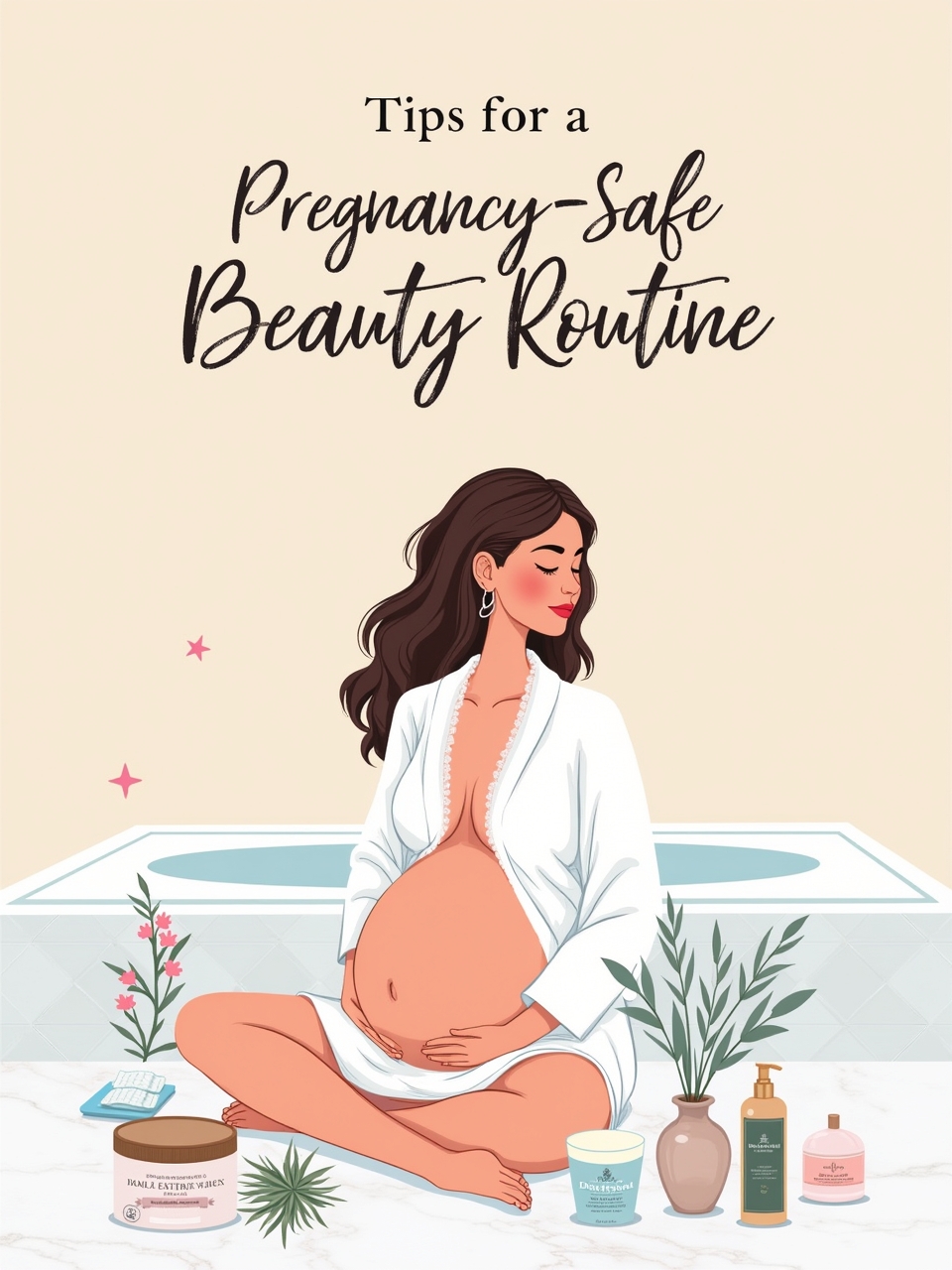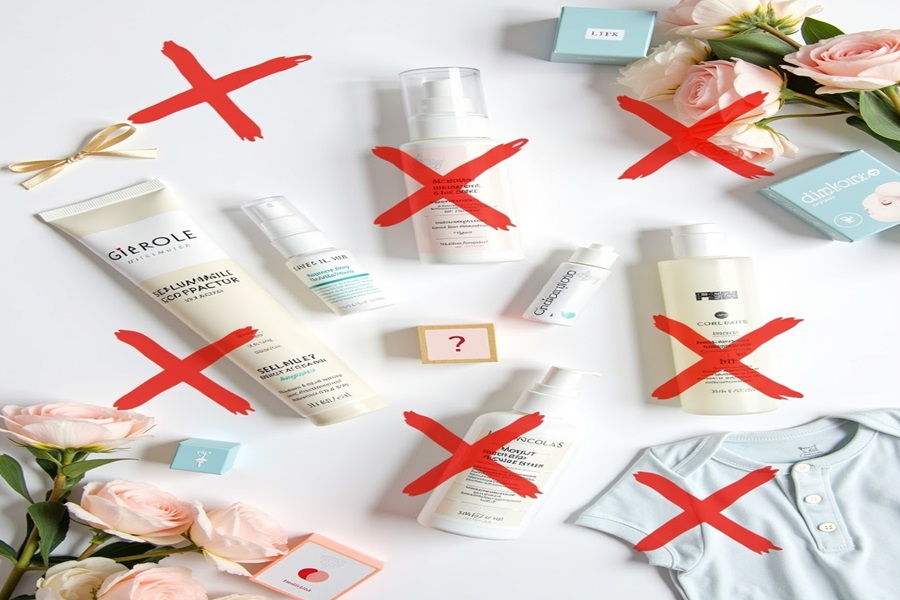Having a baby is an exciting time that also brings many responsibilities—most of which relate to health and safety. Many people put effort into diet, adding supplements and making lifestyle changes, but beautify and skincare products are usually overlooked.
Skin treatment products can give off chemicals that are absorbed by your skin and might endanger your unborn baby. Because of hormone changes during pregnancy, your skin may react differently to various substances. It’s important for expecting women to be aware of which skin care and cosmetics to avoid.
We’ll give you the details on harmful ingredients, explain why pregnant mothers should avoid them, suggest healthier substitutes and provide tips for looking after your skin while expecting so let talk in detail What Beauty Products to Avoid When Pregnant.
Why Ingredients Safety Matters during pregnancy
Since the skin is so big, many things can enter the body, nevertheless, using substances deemed to go deep or using fat-soluble materials generally increases absorption into the blood. Once these substances enter the blood, they can differentially cross into the fetus’s circulation.
In pregnancy, a woman’s body experiences major changes which make the fetus more susceptible to harmful substances in the environment. We take steps to ensure a pregnant person is not exposed to anything that might harm the baby in development, mess with hormones or cause birth abnormalities.
Harmful Beauty Ingredients to Avoid
1. Retinoids ( Vitamin A Derivatives)
Appears in: Anti-aging creams, acne treatments and serums.
You should look out for these names: Retinol, Retin-A, Retinyl palmitate, Tretinoin, Adapalene, Isotretinoin.
Why people should avoid it: Oral isotretinoin (Accutane) may lead to serious birth defects. Even though topical forms are taken up in lesser quantities, doctors suggest not using them at all while pregnant.
The recommended retinol alternative: bakuchiol which is from plants and just as effective.
2. Salicylic Acid (High Concentrations)
Found In: Acne creams, exfoliants, cleansers and peels contain these ingredients.
Why stay away from it: Consuming too much salicylic acid (particularly from tablets or chemical peels) is not safe for mothers during pregnancy. Some Salicylic Acid formulations are strong enough for the acid to penetrate your skin effectively.
Alternative: Instead, you could choose azelaic acid, lactic acid (AHA) or glycolic acid in lower quantities for exfoliating.
3. Hydroquinone
Found In: Creams and cosmetic treatments for skin lightening.
The reason to avoid: Studies show only minimal danger from hydroquinone, but since it’s absorbed very easily by the skin, it may reach the fetus and be a concern. To be safe, it’s best to avoid the drug altogether.
Alternative: Vitamin C serums, niacin amide, licorice root extract.
4. Pthaletes
Found In: Fragrances, nail polish formulas, hair sprays and other products for personal care usually include parabens.
Reason to Avoid: The reason to stay away is that phthalates disrupt hormones in your body. There are studies that tie phthalates with birth defects and problems with development.
How to stop using them: Select products that say phthalate-free and pick items with natural or no fragrance.
5. Parabens
Found In: Makeup, lotions, shampoos and deodorants may include these preservatives.
Reason to Avoid: Parabens can cause problems by resembling estrogen and upsetting hormone levels in the body. Although further studies are required, many specialists recommend women should avoid butylparaben, propylparaben and ethylparaben during pregnancy.
Alternatives: For safety, look for products that either do not have parabens or that are preserved only with natural extracts such as vitamin E or rosemary extract.
6. Formal Dehyde and Formal dehyde Releasers
Found in: Products used to strengthen nails, smooth hair with Brazilian blowouts and adhere false eyelashes.
Why to Stay Away: Cancer, miscarriages and developmental dangers have all been linked to formaldehyde. Some chemicals such as DMDM hydantoin, imidazolidinyl urea and diazolidinyl urea, slowly give off formaldehyde.
Alternative: To be safe, choose nail polishes and treatments that are free from formaldehyde and don’t get a chemical hair straightening done while pregnant.
7. Toluene:
Found In: Both nail polishes and hair dyes contain DBP.
Why to avoid it: Toluene can damage the nervous system and is responsible for birth defects and delays in growth for people who come into high contact with it.
Alternatives: Make sure you buy “3-free” or “5-free” nail polishes free from toluene, formaldehyde or DBP (dibutyl phthalate).
8. Chemical Sunscreens
Found In: Many face sunscreens and body sunscreens include titanium dioxide.
Reason to Avoid: The reason to avoid oxybenzone chemical: It influences hormones and may cause skin allergies. It may get into your bloodstream and has been identified in breast milk and amniotic fluid.
Alternatives: You’re better off choosing mineral sunscreens that cover your skin and are not absorbed such as those with zinc oxide or titanium dioxide.
9. Essential Oils
Found In: You can find essential oils in natural skincare, massage oil and aromatherapy.
Reason to Avoid: During pregnancy, you shouldn’t use any essential oils unless you know they are safe. Some oils, including clary sage, rosemary, basil, thyme and juniper, may cause contractions or change the levels of hormones.
Safety: You should check with a doctor or certified aromatherapist first. Lavender and chamomile are thought to be safe when taken in little amounts
Beauty Treatment to be Cautions With
Beyond product ingredients, some beauty treatments also carry risks
1. Hair Dyeing
- For most people, dyeing hair a few times during the second or third trimester does not seem to cause problems.
- Choose dyes that don’t contain ammonia or are semi-
- Always make sure there is lots of fresh air in the room when you color your
2. Chemical Peels
- Peels with salicylic acid or retinoids are better to
- Lower strength glycolic or lactic acid peels are the safer way to
3. Tanning Products
- Don’t use spray tanning, as it can be dangerous to breathe the
- Self-tanning lotions are thought to be safer, but you should still look for questionable
4. Treatments involving Laser & Botox
- Doctors usually recommend you put off laser, Botox or filler treatments until you have had your child.
Tips for a Pregnancy-Safe Beauty Routine

·Be Careful When Reading the Label
Don’t assume a product is safe only because it has a natural or organic label. Take the time to look at what is listed in the ingredients.
·Opt for cosmetic products designed for developing skin in pregnancy.
A number of brands create products specifically for expecting mothers using only safe ingredients.
·Patch Test Everything
Pregnancy can cause your skin to be more sensitive. Try using a product on a small part of your body before you put it on the whole area.
·Whenever you have the option, use fragrance-free supplies.
Many times the secret is hidden in fragrances by adding chemicals like phthalates.
· Speak to Your OB-GYN or Dermatologist
Always ask your healthcare provider for guidance when you’re not sure about a product.
Safe Brands You Can Wear While Pregnant
Several companies have created collections or products that are ideal for ladies during pregnancy. Examples include:
- The Honest Company
- Belli Skincare
- Earth Mama
- Beauty-counter
- Burt’s Bees
- Pipette
Because these brands include safe, non-toxic ingredients, they are typically dermatologist-tested and suitable for pregnant women.
Pregnancy Can Cause a Few Common Skin Problems
Skin changes brought by hormones may be something you want to address:
- Melasma (mask of pregnancy) – Put on sunscreen daily and switch to treatment creams with vitamin C or azelaic acid.
- Acne – You can try either benzoyl peroxide, up to 5% concentration or azelaic
- While nothing can fully protect you from stretch marks, using creams and oils can increase your skin’s softness.
Conclusion:
When expecting, you can still do your beauty routine, but it needs to be with more careful decisions. It is important to not have retinoids, parabens, phthalates or chemical sunscreens in your beauty products if you are pregnant or breastfeeding. It’s a relief to discover that a variety of safe, trustworthy and healthy alternatives are available.
Pregnancy is all about caring for yourself, so your usual skincare routine can be an easy way to feel at ease and self-confident, but you should pay more attention to how safe the products you use are.
Keep these two points in mind: If you doubt a food, choose easy answers, check the labels and get advice from a medical expert. Having a healthy baby and a glowing mama has never gone out of fashion.

